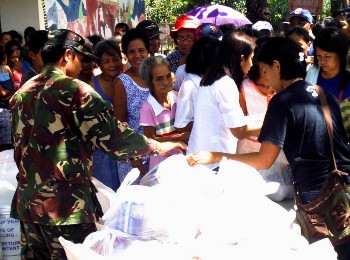
Corresponding Author
Vincenzo Bollettino 
Harvard University, T.H. Chan School of Public Health, Harvard Humanitarian Initiative
vbollett@hsph.harvard.edu
Download activity - last 12 months
Climate Change and Civil-Military Coordination in the Philippines: How climate change disasters will impact aid delivery in areas affected by conflict
- Received: 02 March 2021 / Accepted: 17 January 2022/ Published online: 18 March 2022
-
https://doi.org/10.18783/cddj.v005.i01.a02
Highlights
- Principled civil-military coordination is needed in areas impacted by climate change and conflict, to ensure the integrity of security operations while preserving the independence of humanitarian actors.
- There is a need for research on the role of militaries in responding to disasters in light of anticipated impacts of climate change.
- Consideration of the factors that impede or enhance community resilience in fragile contexts is vital to understanding behaviors related to migration, forced or “voluntary.”
Abstract
The Philippines is one of the most disaster-prone countries in the world and frequently ranks among the top three countries most impacted by disasters. Ongoing conflict with non-state armed actors results in scenarios where civilians are impacted by both conflict and natural hazards. The result is a situation where civilian relief agencies operate in proximity to the military. We argue that there is an important need for principled civil-military coordination in these contexts to ensure the integrity of security operations to support peace and stability while preserving the independence of humanitarian actors serving crisis-affected populations.
The research reveals
significant challenges in protecting the integrity of independence of both
military and humanitarian actors in areas impacted by both conflict and
disaster and underscores the need for principled humanitarian civil-military
coordination to avert threats to both humanitarian aid workers and disaster
affected populations. The findings are particularly relevant to South East Asia
where the use of military in disaster response is common. The findings also underscore
the need for research on the role of militaries in responding to disasters in
light of anticipated impacts of climate change.
Citation
Related Articles
Keywords
Climate Change, Humanitarian Emergencies, Civil-military coordination, Conflict, Disasters
-
A+
-
A
-
A-


